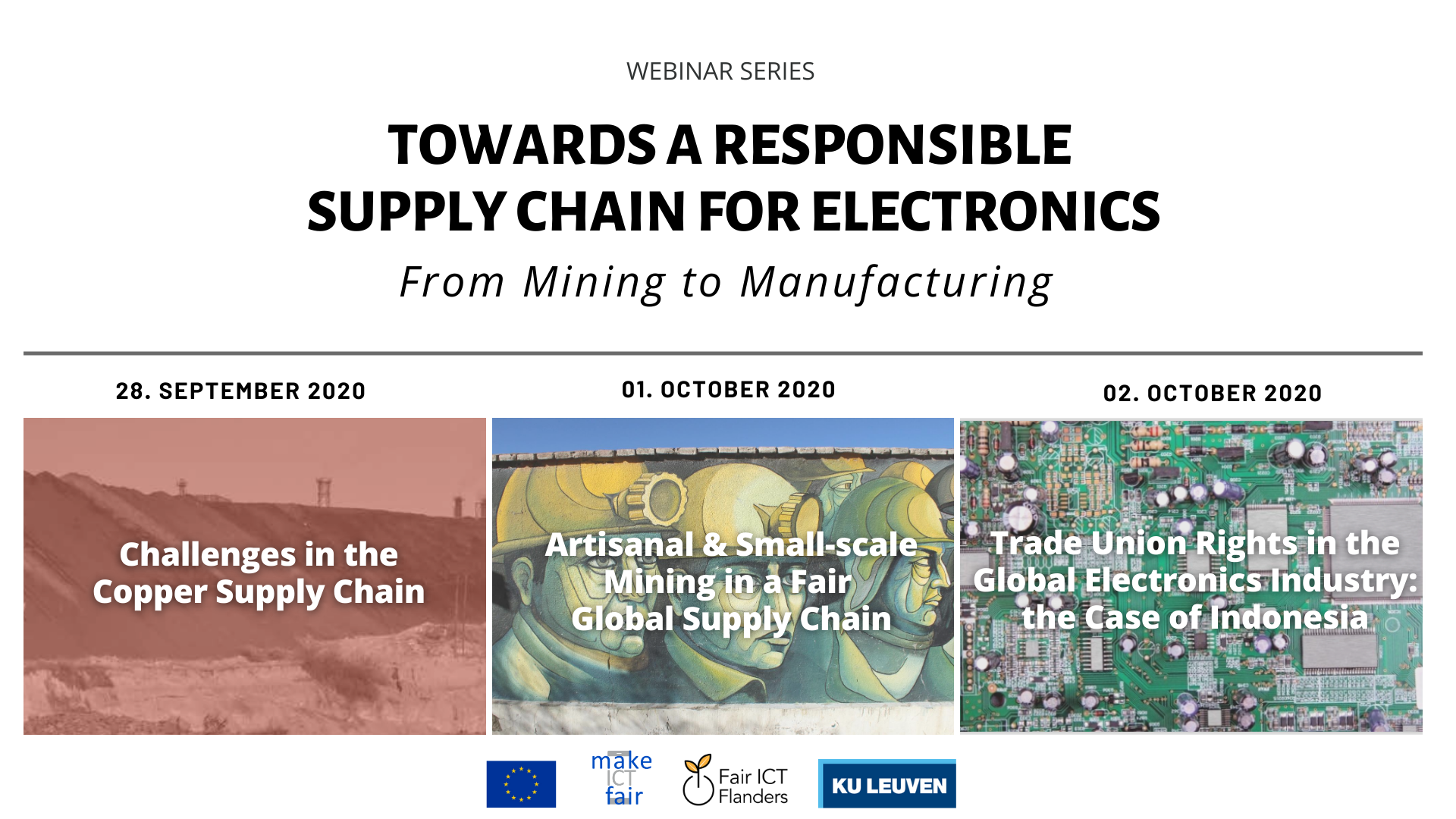WEBINAR SERIES:
Towards a Responsible Supply Chain for Electronics
From Mining to Manufacturing
28th September – 2nd October 2020
The webinars are organised by the Make ICT Fair project, in collaboration with Fair ICT Flanders and supported by KU Leuven SIM2.
Summary
In 2017, eleven European partners joined forces to create the project “Make ICT Fair – Reforming manufacture and minerals supply chains through policy, finance and public procurement”. This diverse partnership (including a university, a newspaper company, an international association of governments, a monitoring organisation, research centers and other specialised civil society organizations) aims at improving the lives of workers and local communities impacted along the ICT supply chain through research, capacity building and campaigning.
Three years later, the consortium is hosting a series of webinars to share the research results, pleading for increased transparency in a fairer ICT supply chain.
In three webinars, the different links of the ICT supply chain, from mineral extraction to manufacturing and assembly are analysed. Key results of the research are presented and the following questions are debated:
- Which levers in the supply chain could drive a fairer ICT supply chain?
- What are the opportunities and calls to action?
These webinars aim to stimulate an open discussion with the sector to achieve a fairer supply chain for electronic devices. Each webinar is structured in two parts:
- Overview of the relevant research results and a brief explanation why its conclusions could help to improve the studied stage in the supply chain.
- Open discussion with the participants.
Provisional Programme
Webinar 1: Challenges in the copper supply chain
28th September, 10:00-11:30 (CEST) | Registration
The current copper production is facing many challenges. Case studies in Zambia, Bulgaria and Namibia are showing large social and environmental impact. Witnesses from local communities and monitoring data are showing the achilles heels of the extraction. However copper is highly demanded in current and future technological applications. New technological innovations are available, ready for upscaling but not yet implemented. (How) Can adequate policy drive this change?
Speakers: Linda Scott Jakobsson (Swedwatch), Daniel Popov (CEEBWN) & Xiaohua Sharron Li (KU Leuven).
Moderator: Charlotte Christiaens (CATAPA).
Webinar 2: Artisanal and Small-scale Mining as part of a fair global supply chain
1st October, 10:00-11:30 (CEST) | Registration
Artisanal and Small-scale Mining (ASM) represents the majority of the workforce engaged in mining activities worldwide. While it is often seen as an informal subsistence activity for local communities, ASM is actually very well integrated in the global metal supply chain. This kind of mining operation is sometimes referred to as the most ‘sustainable’ socio-economic way of exploiting metal ores against its depletion, while it also can cause enormous uncontrolled health and environmental impacts that affect workers and local communities.
This webinar presents one case study of ASM and discusses the local impacts and how their integration in the international market could be a lever to engage other stakeholders towards positive change through enhanced due diligence, monitoring and collaboration.
Speakers: Prof Erik Smolders (KU Leuven), Boris Verbruggen (KU Leuven) & Alberto Vázquez Ruiz (CATAPA).
Moderator: Piet Wostyn (KU Leuven).
Webinar 3: Trade union rights in the global electronics industry: the case of Indonesia
2nd October, 10:00-11:30 (CEST) | Registration
The right to organise is often denied to workers in the electronics industry. In key electronics production sites like China and Vietnam, the only union that workers are allowed to join is the state-sanctioned union. But even in countries where union rights are protected by law, like Indonesia, workers often find it difficult to exercise this right. This webinar presents field research from Bekasi, Indonesia’s prime industrial area just outside Jakarta. Looking at four different electronic factories, the webinar discusses the multiple barriers workers’ face when they seek to exercise their right to freedom of association and the strategies different Indonesian unions have developed in response.
Speakers: Jeroen Merk (University of Edinburgh), Hari Nugroho (University of Indonesia) & Fahmi Panimbang (LIPS).
Moderator: Dave Gorman (University of Edinburgh).
You can choose to register for all three webinars, or just one or two of them, in the registration form.




PRINCE IVON JOSEPH HERNANDEZ
24/09/2020